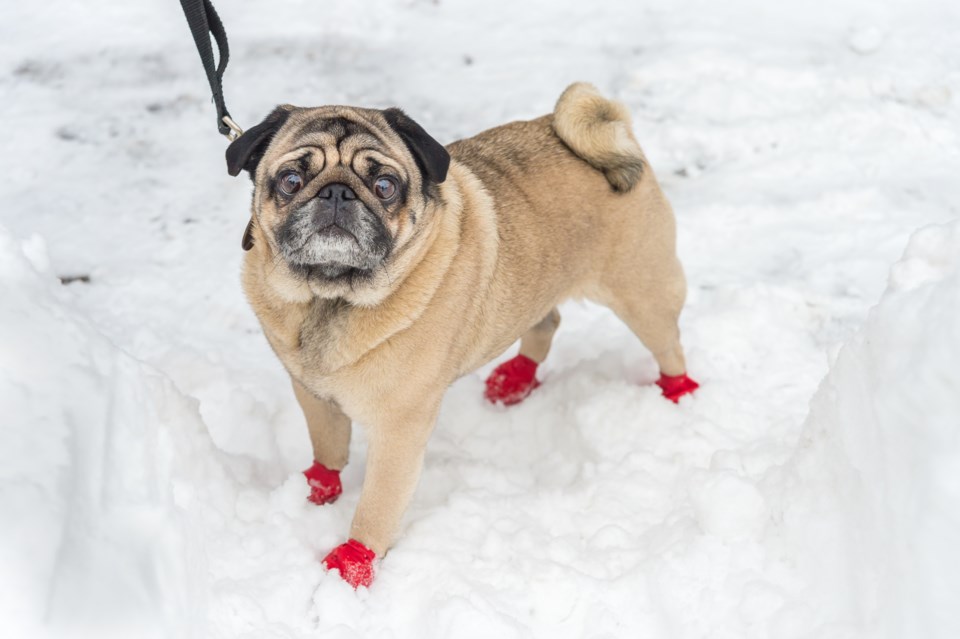With snow finally on the ground and temperatures continuously dipping lower, many pet owners are likely thinking about how to keep their furry loved ones safe from the cold Saskatchewan climate — and the Moose Jaw Humane Society has a few important tips to do just that.
During winter weather, the shelter’s executive director Dana Haukaas stressed how important it is to keep pets indoors and away from the chill as much as possible.
This means containing cats who like to roam the neighbourhood and dogs who think they can’t get enough of the snow in the backyard.
“Cats really should stay inside. If you’re going to let your cat out, it would be best to leave it on a tether in your yard or, if you have a cat that walks on a leash, that would be fine too,” said Haukaas. “Just go for short walks with dogs. Sure, it's important to get a little bit of exercise [but] really be mindful of the degree below zero.”
Keeping pets inside is easy enough on paper, but there are of course moments when those loveable pals need to step outside for various reasons — to do their business, work off some energy, or enjoy a brisk walk.
Haukaas recommends owners keep outdoor excursions on the shorter side, to limit exposure to extreme temperatures.
Just like humans, animals are susceptible to cold-related injuries like frostbite on the most sensitive parts of their body, like ears, tails and the underside of their paws. Animals are also affected by breathing in too-cold air, like people, as it's hard on the lungs.
“Really limit their time outside when those temperatures get really cold,” said Haukaas. “In those cold temperatures, due to exposure, [pets] can lose the tips of their ears, they can lose their tail.”
For those that still need to head out for a walk to burn energy, Haukaas offered a few tips to consider when heading out and signs to look out for to know when to go home.
Animals have very sensitive paws, said Haukaas, so investing in a pair of dog or cat booties will help pets walk outdoors for longer. Warm jackets are also a good idea, to help your pet keep their body heat close and protect from the cold.
For those who don’t like booties — either owners or pets themselves — keep an eye on your pet’s feet.
“With any animal, once the temperature starts to bother them, they will start to lift their feet, alternating their paws,” said Haukaas. “And that's a sign that it's time to come in, for sure.”
It's also a good practice to wipe your pet’s paws when they come inside, to clean off any sidewalk salt or other ice-busting chemicals used on sidewalks.
“Not everyone uses salts that are pet friendly, so when you come home, your pet’s paws can become irritated if you don’t wash them,” said Haukaas. “Dip them into some clean water, wipe their paws and dry them off really good to make sure there’s none of that salt left on there.”
Pet parents should also remember to look for signs of frostbite when pets come in, like curling on the tips of their ears, said Haukaas. If you notice this, seek medical attention from the vet right away, as it can be very painful for animals.
Overall, Haukaas emphasized one very easy rule to remember.
“If it’s too cold for you to be outside, it’s too cold for them,” said Haukaas.
Haukaas also shared that during the cold months, the shelter has tons of people bring in stray cats to save them from the cold.
While there isn’t unlimited space, Haukaas encourages people in the community to report stray cats to the shelter as soon as they feel concerned — as in, before temperatures drop really low.
She also encourages people to consider sheltering strays themselves through the winter, but be sure to call the shelter first — sometimes those cats have homes already.
“If you think a cat doesn’t have a home, we really are your best bet. If we don’t have space, we might ask you to hold the cat for a day or two if you have the ability [but] we are your best resource,” said Haukaas. “And we recommend contacting the Humane Shelter [before keeping a stray] in case we have the owner looking for that pet.”
If you see a stray cat or dog, Haukaas encourages contacting the Humane Society at 1 (306) 692-1517 to report the animal, especially if it may be in need. Staff are on call 24/7 for emergencies.




